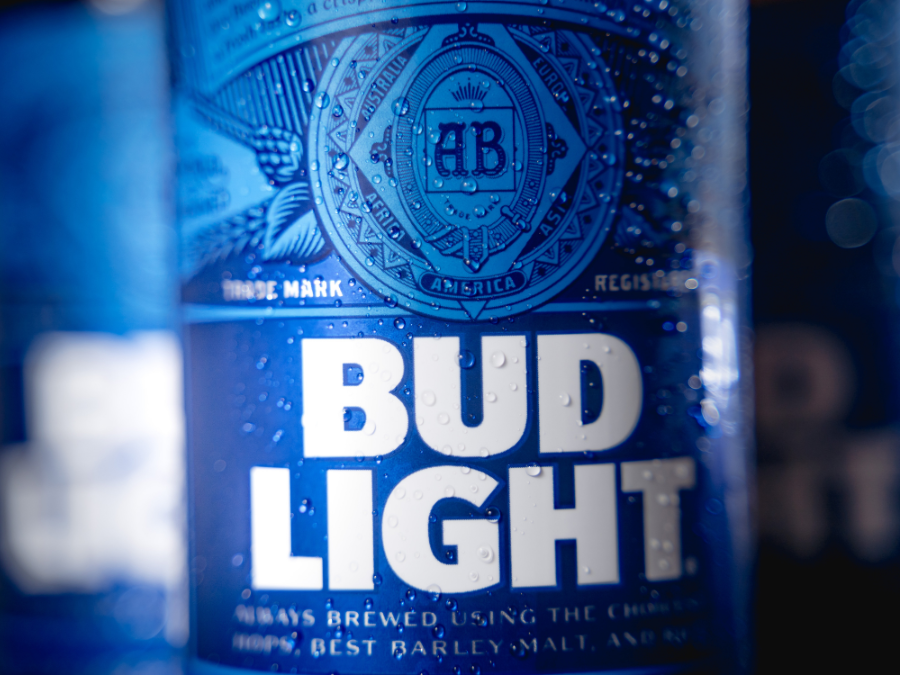
The CEO of Anheuser-Busch InBev has sought to play down the impact of falling sales volumes arising from the controversy that has engulfed the Bud Light brand in the US.
In a lengthy statement following the publication of the company’s first-quarter financial results, CEO Michel Doukeris said Bud Light’s US sales declines in the first three weeks of April represented 1% of the company’s global volumes during the same period.
“Seeing [the situation] in the context of our global business gives us perspective,” he said. “Over the years, our global footprint has enabled us to successfully navigate different types of challenges such as the temporary ban on beer sales in certain countries, and the month-long shut down of bars and restaurants across the globe.”
Doukeris’ comments follow a week in which AB InBev’s Bud Light brand has continued to attract headlines. The company’s CEO said it was too early for the brewer to understand the full impact of the backlash – resulting from its sending of a custom canto transgender influencer Dylan Mulvaney – on its US business.
He admitted, however, there had been “some spillover” that was impacting sales of other AB InBev brands in the US.
In a bid to bounce back, the Budweiser brewer is to triple its media investment in the Bud Light brand this summer, while doubling down on key partnerships for the brand including with the NFL draft and at music festivals across the US this summer.

US Tariffs are shifting - will you react or anticipate?
Don’t let policy changes catch you off guard. Stay proactive with real-time data and expert analysis.
By GlobalData“Everything we do should be about beer and should promote beer,“ he said. ”It is an essential part of life’s meaningful moments, whether in sports, music or celebrations. These are moments that bring people together. And this is why I love beer.
“While beer will always be at the table when important topics are debated, the beer itself should not be the focus of the debate. Bud Light is about being easy to drink and easy to enjoy. That’s what consumers want and that’s what we are focused on delivering.“
Doukeris also confirmed reports the brewer was offering financial support to its US wholesalers, many of which claim they have borne the brunt of public backlash and boycotting of the brand.
“This situation has impacted our people, especially our frontline workers, the delivery drivers, sales representatives, our wholesalers, bar owners and servers,” he said. “We’ve been doing everything we can to support our teams, ensuring they are safe continuing to brew, package and – together with our wholesalers – deliver great beer to the market.”
On what the Stella Artois brewer had learnt from the promotion and subsequent fallout, he said: “We need to understand the current environment and especially social media landscape and how consumer brands, especially big brands with significant reach, can be pulled into a discussion like this one.”
“We need to continue to clarify the fact that this was one can, one influencer and one post and not a campaign… As we move forward, we have adjusted and streamlined our marketing structure so the most senior marketeers are more closely connected to every aspect of our brands.”
AB InBev’s organic growth strategy
Elsewhere, CFO Fernando Tennenbaum told analysts AB InBev did not need M&A to “deliver meaningful growth,” echoing recent comments made by Dourkeris in which the CEO hinted the company would look to prioritise brand building over dealmaking.
“We know how to use M&A. We did it in the past and we know how to create value out of M&A,” he said. “If the right moment shows up of course we can take it if it can bring another avenue of growth. But we don’t need M&A to deliver meaningful value creation and to continue to grow.”
In the first three months of 2023, AB InBev reported sales of$14.2bn, a 13.2% organic rise that beat analysts’ expectations of a 9.9% increase.
Volumes were up 0.9%, in line with consensus, driven by a steep rise in Asia-Pacific caused by the rolling back of Covid-19 restrictions in China.
EBITDA, meanwhile, also exceeded expectations, growing by 13.6% compared with consensus expectations of a 5.6% rise.
Despite the better-than-expected quarterly results, the Michelob Ultra brewer maintained its medium-term outlook of between 4-8% EBITDA growth, with revenues growing ahead of this as a result of volume growth and pricing action.
On why the results had not given AB InBev cause to up its guidance, Doukeris said: “We gave out middle-term outlook guidance at the end of 2021 because we are moving from an inorganic strategy to an organic one.
“When we look at the middle term, that’s the growth that our business can sustain and can deliver. There are going to be good quarters and there are going to be bad quarters, and there are going to be different regions of the world performing in different ways.”



